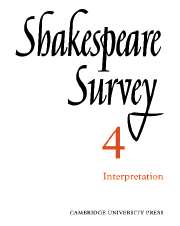Book contents
- Frontmatter
- Fifty Years of Shakespearian Criticism: 1900–1950
- Motivation in Shakespeare’s Choice of Materials
- The Sources of Macbeth
- Shakespeare and the ‘Ordinary’ Word
- Malone and the Upstart Crow
- An Early Copy of Shakespeare's Will
- The Shakespeare Collection in the Bodleian Library, Oxford
- Was there a ‘Tarras’ in Shakespeare’s Globe?
- Tradition, Style and the Theatre To-day
- Shakespeare in Slovakia
- Shakespeare in Post-War Yugoslavia
- International Notes
- Shakespeare’s Comedies and the Modern Stage
- The Year's Contributions to Shakespearian Study 1 Critical Studies
- 2 Shakespeare’s Life, Times and Stage
- 3 Textual Studies
- Book Received
- Index
- Plate Section
Fifty Years of Shakespearian Criticism: 1900–1950
Published online by Cambridge University Press: 28 March 2007
- Frontmatter
- Fifty Years of Shakespearian Criticism: 1900–1950
- Motivation in Shakespeare’s Choice of Materials
- The Sources of Macbeth
- Shakespeare and the ‘Ordinary’ Word
- Malone and the Upstart Crow
- An Early Copy of Shakespeare's Will
- The Shakespeare Collection in the Bodleian Library, Oxford
- Was there a ‘Tarras’ in Shakespeare’s Globe?
- Tradition, Style and the Theatre To-day
- Shakespeare in Slovakia
- Shakespeare in Post-War Yugoslavia
- International Notes
- Shakespeare’s Comedies and the Modern Stage
- The Year's Contributions to Shakespearian Study 1 Critical Studies
- 2 Shakespeare’s Life, Times and Stage
- 3 Textual Studies
- Book Received
- Index
- Plate Section
Summary
This survey of twentieth-century criticism will be mainly confined to works of interpretation. Bibliographical and textual works will be entirely excluded; biographical works will be discussed only in so far as they contain criticism, so that for the present purpose E. K. Chambers’s Shakespeare: A Survey is more relevant than his imposing and indispensable Shakespeare: A Study of Facts and Problems; works of scholarship which deal with special problems, such as authenticity or sources, will be mentioned only incidentally; and little attempt will be made to do justice to the many valuable books which have appeared during the last fifty years on such subjects as the Elizabethan Stage—books which have profoundly affected our understanding of Shakespeare’s own works. Impressive as much of the interpretative criticism of the period has been, it might be argued that it has not been the literary critics who have added most to our understanding of the plays but rather the textual critics who have brought us nearer to what Shakespeare wrote, the scholars who have increased our knowledge of the stage and audience for which he wrote and of the mental climate in which he lived, and the producers who have given us a chance of seeing Shakespeare’s plays more or less as they were written, so that we can see that many of their alleged faults vanish when they are performed with some understanding of Elizabethan conventions. As a last caveat, it should be mentioned that although an attempt will be made to consider all important English-speaking critics only occasional reference will be made to those who have written in other languages.
- Type
- Chapter
- Information
- Shakespeare Survey , pp. 1 - 25Publisher: Cambridge University PressPrint publication year: 1951

